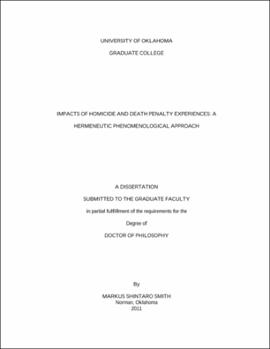| dc.contributor.advisor | Vaughn, Courtney | |
| dc.creator | Smith, Markus Shintaro | |
| dc.date.accessioned | 2019-04-27T21:37:22Z | |
| dc.date.available | 2019-04-27T21:37:22Z | |
| dc.date.issued | 2011 | |
| dc.identifier | 99354415802042 | |
| dc.identifier.uri | https://hdl.handle.net/11244/319189 | |
| dc.description.abstract | There exists a culture of surviving victims who possess a body of knowledge stemming from their experiences of dealing with homicide. In reviewing the literature on surviving victims, whether they are survivors of the victim (Master et al. 1987) or the accused (Sharp 2005), it is evident that their diverse views are often unrealized or ignored by the very citizens and policymakers responsible for initiating and evaluating criminal justice policies (King 2003; Armour 2002; Thompson et al. 1998; Kilpatrick et al. 1990). Ignoring this group, perhaps those who could contribute most to the dialogue surrounding criminal justice policy, limits the body of cultural knowledge which can be transmitted and used to educate the citizenry, thereby resulting in producing flawed public policy that, ultimately, negatively impacts citizens and the entire nation (Constantine 2000). The "transmission" of informed knowledge and "cultural wealth," as posited in John Dewey's Democracy and Education (1916) and Jane Roland Martin's Cultural Miseducation (2002), is crucial because an informed citizenry is essential for any democracy to thrive. | |
| dc.description.abstract | Though the transmission of knowledge is important, this study primarily serves as an educative instrument by producing a body of cultural knowledge to enrich the lived experiences of six surviving victims and to convey their growth from the tragic event. The collective growth from tragedy serves an educative and democratic purpose, because it mends the knowledge gap by informing and increasing public awareness which, in turn, dissolves public ignorance and ensures equity in the creation of effective and successful policy. The researcher believes that his position as a professor at a community college affords him the | |
| dc.description.abstract | opportunity to go beyond an academic community and to reach and carry out this educative process (in the spirit of Dewey and Martin) to average citizens as well - or, non-traditional students who are working-class adults who oftentimes occupy an unentitled status. | |
| dc.description.abstract | A series of interviews, journal notes, audio-recordings, and transcriptions were used to collect the data for this interpretive phenomenological study. van Manen's (1990) phenomenological methodology provides an etic overlay with which to understand the participants' existential lifeworlds: temporality (lived time), spatiality (lived space), relationality (lived relation), and corporeality (lived body). This process initiates the peeling back of the layers of reflection to expose the participants' growth from tragedy. Based on the findings, three thematic categories emerged from the lived experiences: validity of the criminal justice system and the death penalty, finding peace or closure, and the impact of the southern region and Oklahoma. The thematic categories ultimately reveal how each participant has grown from tragedy which, more importantly, informs citizens about a need for changes in how public opinion polls are used to evaluate the validity of criminal justice policies, especially death penalty policy. | |
| dc.description.abstract | The significance of the study calls for future research to enrich the understanding of how surviving victims have been affected by tragedy and then to use that cultural knowledge to educate others, whether it be other surviving victims, research scholars, policymakers, media, uninformed citizens, etc. To be informed is essential for the success of a democratic state (Mill 1859; Barber 1995; Lau & Redlawsk 1997), being that the majority's views prevail, which influences the direction of government and public policy. | |
| dc.format.extent | 196 pages | |
| dc.format.medium | application.pdf | |
| dc.language | en_US | |
| dc.relation.requires | Adobe Acrobat Reader | |
| dc.subject | Murder victims' families--Psychology--Case studies | |
| dc.subject | Murderers--Family relationships--Case studies | |
| dc.title | IMPACTS OF HOMICIDE AND DEATH PENALTY EXPERIENCES: A HERMENEUTIC PHENOMENOLOGICAL APPROACH | |
| dc.type | text | |
| dc.type | document | |
| dc.thesis.degree | Ph.D. | |
| ou.group | Jeannine Rainbolt College of Education::Department of Educational Leadership and Policy Studies | |
